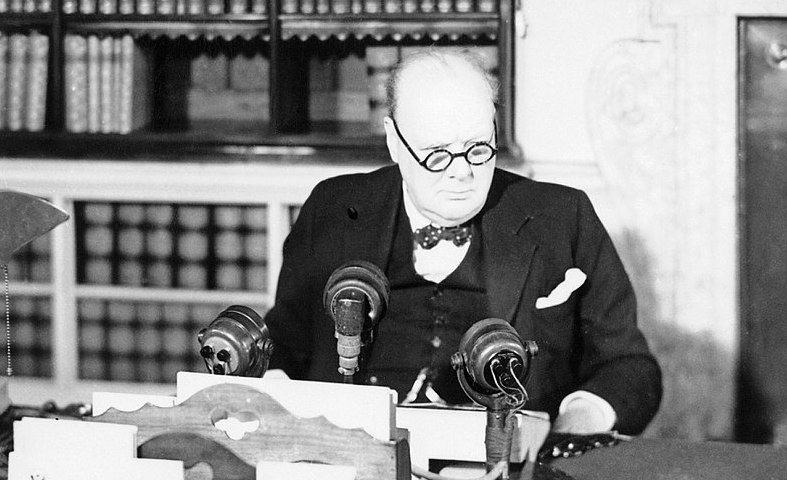
Churchill on Representative Government, and the Voters It Represents
Blood, toil, tears, and voters
Dominic Lawson, son of Margaret Thatcher’s Chancellor of the Exchequer, wrote awhile back that “the public want honesty, but not when it comes to their taxes.” Voters, Lawson argued, will never undo the government entitlements that are bankrupting modern democracies. It is ludicrous, he adds, for British Conservatives to deplore the national debt, and then “to propose measures which would do nothing to reduce it, but actually increase it. It’s as if Churchill had declared, ‘I have nothing to offer but blood, toil, tears, sweat and tax cuts.’”
This would seem an evergreen subject, especially when Mr. Lawson ventured into history: “Indeed, it is an enduring myth that even as Prime Minister during the war itself, Churchill’s offer of “nothing but blood, toil, tears and sweat” was invariably welcome to the British voters. As Angus Calder pointed out in his iconoclastic book The People’s War, strikes were common, the government not especially popular, and Churchill himself an object of much public disparagement—even if that didn’t find expression in the columns of the newspapers.” This was why Churchill received “an overwhelming raspberry” from voters in the July 1945 election.
How popular was Churchill, really?
The last is an oversimplification. Churchill polled well throughout the war and was well thought of individually. The voters didn’t turn Churchill out in 1945. They turned out the Conservatives, and with considerable justification. Many actually thought they could vote Labour and retain Churchill as Prime Minister.
Mr. Lawson was not wrong about British attitudes when Churchill first spoke as Prime Minister on 13 May 1940. In 1988, Alistair Cooke spoke of growing up in Britain after World War I, constantly reminded of a lost generation: “The British people would do anything to stop Hitler—except fight him.” Applause in the House of Commons on was then still louder for Chamberlain than for Churchill.
But Churchill’s speeches quickly turned attitudes around. By June, after the French debacle and Dunkirk, there was a different mood. Churchill’s postwar bodyguard, Ronald Golding, then an RAF Squadron Leader, recalled: “After his ‘fight on the beaches’ speech [4 June 1940], we wanted the Germans to come.”
Did WSC favor return to property qualification for voters?
Lawson rather misrepresented Churchill’s proposals for franchise reform when he wrote:
Churchill, admittedly, had never been completely persuaded of the benefits of the universal franchise. In 1930 he had published an essay—”Parliamentary Government and the Economic Problem”—which advocated its abandonment and a return to a property franchise (combined with proportional representation). I imagine that [today] Churchill would argue that it is next to impossible to persuade a majority of the need for sharp public expenditure cuts, when millions of households would feel that such a policy would cost them more in benefits than they would ever get back by way of a reduction in taxes.
Churchill frequently floated “trial balloons,” thinking out loud about the nature of democracy. He did a “bonus vote” for what he vaguely defined as the “more responsible” level of citizens. But he never led a movement or tabled a bill for such a reform. Nor in “Parliamentary Government and the Economic Problem” (reprinted in Thoughts and Adventures), did Churchill advocate “abandonment” of the universal vote or a “return to a property franchise.”
What he did suggest was as follows. (Remember, this was in the midst of the Depression)…
…an Economic sub-Parliament debating day after day with fearless detachment from public opinion all the most disputed questions of Finance and Trade, and reaching conclusions by voting, would be an innovation, but an innovation easily to be embraced by our flexible constitutional system. I see no reason why the political Parliament should not choose, in proportion to its party groupings, a subordinate Economic Parliament of, say, one-fifth of its numbers and composed of persons of high technical and business qualifications.[1]
A government representative of voters
Crucially, Churchill saw such a “sub-Parliament” as representative of the electorate. Today, we see much less democratic forms in the regulatory agencies or individuals (“Czars” in current American political parlance). These are unelected, yet they possess legislative power. Churchill would have been opposed to these. He never favored the “abandonment of Parliamentary Government.” Indeed quite the opposite, as he wrote in 1930:
I see the [Parliament] a living and ruling entity; the swift vehicle of public opinion; the arena—perhaps fortunately the padded arena—of the inevitable class and social conflict; the College from which the Ministers of State are chosen, and hitherto the solid and unfailing foundation of the executive power. I regard these parliamentary institutions as precious to us almost beyond compare. They seem to give by far the closest association yet achieved between the life of the people and the action of the State. They possess apparently an unlimited capacity of adaptiveness…an effective buffer against every form of revolutionary or reactionary violence. It should be the duty of faithful subjects to preserve these institutions in their healthy vigour, to guard them against the encroachment of external forces, and to revivify them from one generation to another from the springs of national talent, interest, and esteem.[2]
Endnotes
1. Winston S. Churchill, Thoughts and Adventures, James W. Muller, ed. (Wilmington, Delaware: ISI Books, 2009), 255.
2. Ibid., 246-47.
Further reading
“In Defense of Churchill: A Life Devoted to Constitutional Liberty,” 2021






